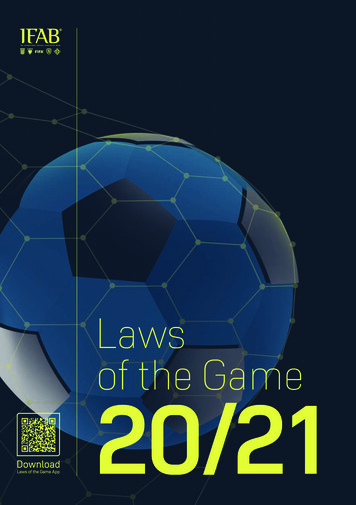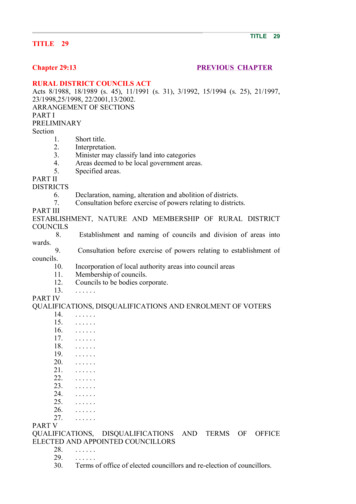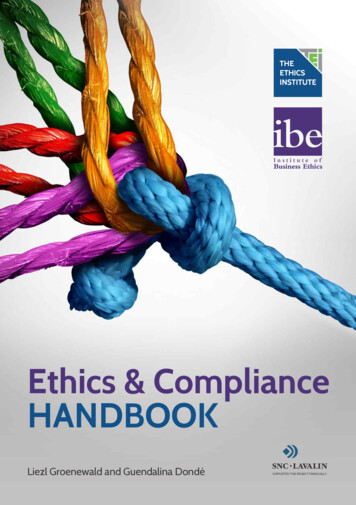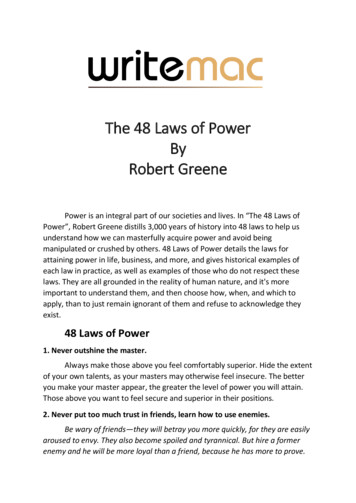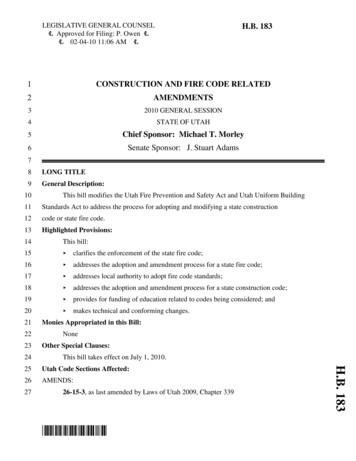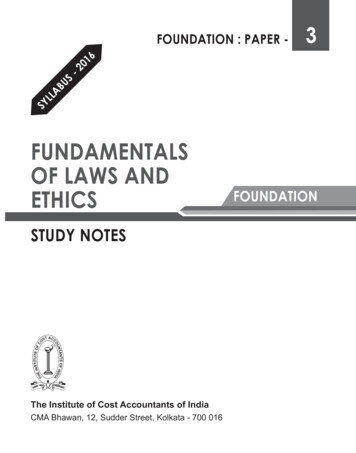
Transcription
3SYLLABUS-2016FOUNDATION : PAPER -FUNDAMENTALSOF LAWS ANDETHICSSTUDY NOTESThe Institute of Cost Accountants of IndiaCMA Bhawan, 12, Sudder Street, Kolkata - 700 016FOUNDATION
First Edition : August 2016Edition : August 2019Published by :Directorate of StudiesThe Institute of Cost Accountants of India (ICAI)CMA Bhawan, 12, Sudder Street, Kolkata - 700 016www.icmai.inPrinted at :M/s. Sap Prints Solutions Pvt. Ltd.28A, Lakshmi Industrial EstateS. N. Path, Lower Parel (W)Mumbai - 400 013, MaharashtraCopyright of these Study Notes is reserved by the Institute of CostAccountants of India and prior permission from the Institute is necessaryfor reproduction of the whole or any part thereof.
Syllabus - 2016PAPER 3: FUNDAMENTALS OF LAWS AND ETHICS (FLE)Syllabus StructureABFundamentals of Commercial LawsFundamentals of Ethics70%30%B30%B30%A70%ASSESSMENT STRATEGYThere will be written examination paper of three hours.OBJECTIVESTo gain basic knowledge in Laws and Ethics to understand the concepts of regulatory compliance, requirements anddesired ethics expected from professionals.Learning AimsThe syllabus aims to test the student’s ability to: Acquire adequate knowledge of the basic concepts of laws Understand the basic knowledge of ethics including allied regulatory compliance and requirementsSkill sets requiredLevel A: Requiring the skill levels of knowledge and comprehensionNote: Subjects related to applicable statutes shall be read with amendments made from time to time.Section A : Fundamentals of Commercial Laws1. Indian Contract Act, 18722. Sale of Goods Act, 19303. Negotiable Instruments Act,1881Section B : Fundamentals of Ethics4. Ethics and BusinessSECTION A: FUNDAMENTALS OF COMMERCIAL LAWS [70 MARKS]1.Indian Contract Act, 1872(a) Essential elements of a contract, offer and acceptance(b)Void and voidable agreements(c) Consideration, legality of object and consideration(d)Capacity of Parties, free consent(e) Quasi Contracts, Contingent Contracts2.(f)Performance of Contracts(g)Discharge of Contracts(h)Breach of Contract and Remedies for Breach of ContractSale of Goods Act, 1930(a)Definition(b)Transfer of ownership(c)Conditions and Warranties40%20%10%30%
3.(d)Performance of the Contract of Sale(e)Rights of Unpaid Vendor(f)Auction SalesNegotiable Instruments Act,1881(a)Negotiable Instruments –Characteristics of Negotiable Instruments(b)Definitions of Promissory Note, Bill of Exchange and Cheque(c)Differences between Promissory Note, Bill of exchange and Cheque(d)Crossing – Meaning, Definition and Type of CrossingSECTION B: FUNDAMENTALS OF ETHICS [30 MARKS]4.Ethics and Business(a)Ethics – Meaning, Importance(b) The “Seven Principles of Public Life” – Selflessness, Integrity, Objectivity, Accountability, Openness, Honestyand Leadership(c)The relationship between Ethics and Law(d)Ethics in Business
ContentsSECTION – A FUNDAMENTALS OF COMMERCIAL LAWSStudy Note 1 : Indian Contract Act, 18721.1Essential elements of a contract, offer and acceptance11.2Void and voidable agreements111.3Consideration, legality of object and consideration131.4Capacity of Parties, Free consent171.5Quasi Contracts, Contingent Contracts261.6Performance of Contracts301.7Discharge of contracts361.8Breach of Contract and Remedies for Breach of Contract38Study Note 2 : Sale of Goods Act, 19302.1Definition892.2Transfer of ownership932.3Conditions and Warranties972.4Performance of the Contract of Sale1012.5Rights of Unpaid Vendor1042.6Auction Sales106Study Note 3 : Negotiable Instruments Act, 18813.1Negotiable Instruments –Characteristics of Negotiable Instruments1213.2Definition of Promissory Note, Bill of Exchange and Cheque1263.3Differences between Promissory Note, Bill of exchange and Cheque1303.4Crossing – Meaning, Definition and Types of Crossing130
SECTION – B FUNDAMENTALS OF ETHICSStudy Note 4 : Ethics and Business4.1Ethics – Meaning, Importance1434.2 The “Seven Principles of Public Life” - Selflessness, Integrity, Objectivity,Accountability, Openness, Honesty and Leadership.1454.3The relationship between Ethics and Law1464.4Ethics in Business146
Section AFundamentals of Commercial Laws(Syllabus - 2016)
The Indian Contract Act, 1872Study Note - 1THE INDIAN CONTRACT ACT, 1872This Study Note includes1.1Essential Elements of a contract, offer and acceptance1.2Void and Voidable Agreements1.3Consideration, Legality of object and consideration1.4Capacity of Parties, Free Consent1.5Quasi Contracts, Contingent Contracts1.6Performance of Contracts1.7Discharge of Contracts1.8Breach of Contract and Remedies for Breach of ContractLaw revolves around rights and liabilities.In India people have three types of rights:(a) Human Rights.(b) Constitutional Rights.(c) Contractual Rights.These are explained below in brief (a) Human Rights: There is no law. United Nations have adopted an Universal Declaration of HumanRights which has been adopted by member countries including India. We have National HumanRights Commission and State Human Rights Commission. Human is above common law.(b) Constitutional Rights: This is available to all citizens as per constitution. Basic rights are calledfundamental rights and if Govt. or Govt. organisation violates any right, remedy is available to thecitizen by making writ petition to High Court.(c) Contractual Rights: These are rights and obligations created voluntarily between parties by makingcontracts.1.1 ESSENTIAL ELEMENTS OF A CONTRACT, OFFER AND ACCEPTANCEIntroduction:Before enactment of Indian Contract Act, 1872, the courts in India used to apply English Commonlaws as suited to Indian conditions, customs and usages. Some difficulties were noticed in using EnglishCommon laws. Accordingly later the courts started deciding cases based on Hindu Personal lawsand Muslim personal laws. But the same were still not found fit to address the business complexities.Accordingly separate Indian Contract Act, 1872 was enacted. This Act is based on English Commonlaw, which is to a large extent made up of judicial precedents.The law relating to contracts is contained in the Indian Contract Act, 1872. The Act as originally enactedis divided into four parts:THE INSTITUTE OF COST ACCOUNTANTS OF INDIA1
Fundamentals of Laws and Ethics1. Law relating to general principles of contract.2. Law relating to sale of goods.[Sec. 76 – 123] **3. Law relating to special contracts[Sec. 124 – 238](Contract of Indemnity and Guarantee, Bailment, Pledge, Contract of Agency)4. Law relating to Partnership business[Sec. 239 – 266] **Note:** These sections are repealed from the Indian Contracts Act and two new Acts were enacted for thesame. They are:1. The Sale of Goods Act, 19302. The Indian Partnership Act, 1932.The Indian Contracts Act came into force on 1st September, 1872. The act is applicable to the whole ofIndia except for the state of Jammu and Kashmir.Definition of Contract:Section 2(h) of the Act defines the term contract as “an agreement between two or more partiesenforceable by law”.Pollock defines contract as “Every agreement and promise enforceable at law is a contract”Another definition of Contract given by Salmond is “contract is an agreement creating and definingobligations between the parties.”From the above analysis of the definition of contract, it is clear that contract is based on enforceabilityof an agreement. So agreement and its enforceability are two essential component of a contract. Ifeither of these two is missing there is no contractDefinition of agreement:Agreement has been defined in section 2(e) as “every promise and every set of promises formingconsideration for each other”According to Sec 2 (b), ‘when the person to whom the proposal is made signifies his assent thereto, theproposal is said to be accepted and a proposal when accepted becomes a contract.Summing together all the three definition we can say an accepted proposal/offer is an agreement.When we say that an accepted proposal/offer creating legal relationship or enforceable by law is acontract in ordinary sense, it raise another point how a person will accept an offer/proposal. Answer iswhen he consented to it or in other words there must be consensus ad idem, meeting of mind of boththe parties to the contract. The essence of agreement or in turn contract is meeting of mind of theparties. The parties to an agreement must have agreed upon the subject in the same sense and at thesame time. Unless there is consensus ad idem, there cannot be any contract.Example:A had two motor cars Maruti Alto and Maruti 800; he intends to sell Maruti 800 to B. But B thought he isselling Maruti Alto agrees to his proposal. Since there is no meeting of mind both understood the sametransaction differently, there is no consensus ad idem. Accordingly there is no consent and thus thereis no contract.Will all agreements give rise to a contract?An agreement to become a contract must give rise to a legal obligation. Agreement can be socialobligation or legal obligation.An agreement giving rise to social obligation is not a contract. That is why it is said that the term2THE INSTITUTE OF COST ACCOUNTANTS OF INDIA
The Indian Contract Act, 1872agreement is a wide term it includes both social and legal obligations but only those agreementswhich the parties intend to enforce legally culminates into contract.An agreement is regarded as a contract when it is enforceable by law.Legal obligations arise to make an agreement, a contract. It means that an agreement must give Legalrise to legal obligations. There must be an intention to create legal obligation. In case of agreementregulating business relation it is assumed that the parties intended legal consequences. Thus,Agreement Offer AcceptanceContract Agreement Enforceability by LawDefinitions u/s. 2 of the Indian Contract Act, 1872An agreement to become a contract must give rise to a legal obligation.SectionDefinesAs2 (a)Proposal/ OfferWhen one person signifies to another, his willingness to do or toabstain from doing anything, with a view to obtaining the assent ofthat other to such act or abstinence, he is said to make a proposal2 (b)PromiseWhen the person to whom the proposal is made signifies his assentthereto, the proposal is said to be accepted. A proposal, whenaccepted, becomes a promise2 (c)Promisor andPromiseeThe person making the proposal is called the “promisor”, and theperson accepting the proposal is called the “promisee”2 (d)ConsiderationWhen, at the desire of the promisor, the promisee or any other personhas done or abstained from doing, or does or abstains from doing,or promises to do or to abstain from doing, something, such act orabstinence or promise is called a consideration for the promise.2 (e)AgreementEvery promise and every set of promises, forming the considerationfor each other, is an agreement;THE INSTITUTE OF COST ACCOUNTANTS OF INDIA3
Fundamentals of Laws and Ethics2 (f)Promises which form the consideration or part of the considerationReciprocal Promfor each other are called reciprocal promises. Reciprocal promisesisesrequires both the parties to the agreement to do something.2 (g)Void Agreement An agreement not enforceable by law is said to be void;2 (h)Contract2 (i)Voidable ContractAn agreement which is enforceable by law at the option of oneor more of the parties thereto, but not at the option of the other orothers, is a voidable contract. The contract will be void if the partyhaving the option donot make it valid.2 (j)Void ContractA contract which ceases to be enforceable by law becomes voidwhen it ceases to be enforceable.An agreement enforceable by law is a contract;Essential Elements of a Valid Contract:(i) Agreement:In order to constitute a contract, there must be an agreement in first place. An agreement in turnis composed of two elements-offer and acceptance. Thus there must be at least two parties-onemaking the offer and another accepting it. The terms of offer must be definite and the acceptancemust be absolute and unconditional.(ii) Free Consent: All contracts need to be voluntary.According to Sec 14, ‘Consent is said to be free when it is not caused by coercion, undueinfluence, fraud, misrepresentation or mistake. If consent is not free, then no valid contract comesinto existence. This will discussed in detail subsequently.(iii) Lawful consideration:The agreement must be supported by a lawful consideration. Consideration means ‘something inreturn’. ‘Something in return’ may be an act or abstinence. But it must be real and lawful. This willbe discussed in detail subsequently.(iv) Parties are competent:The parties to an agreement must be capable of entering into a contract. A person is consideredcompetent if he is (a) eighteen years of age (b) of sound mind (c) not disqualified from contractingby any law to which he is subject. Existence of free consent implies the consent of the parties mustbe free and genuine i.e. not induced by coercion, undue influence, fraud or misrepresentation.This will be discussed in detail subsequently.(v) Legality of object:There must be legality of object and consideration failing which it will not be a valid contract. Thiswill be discussed in detail subsequently.(vi) Legal Relationship:The parties must intend to create a legal relationship. Agreements of social or domestic nature donot contemplate legal relationship, so they are not contracts.Example: A husband promising his wife to buy her a ‘necklace’ on occasion of her birthday is nota contract.4THE INSTITUTE OF COST ACCOUNTANTS OF INDIA
The Indian Contract Act, 1872(vii) Agreements not expressly declared to be void:The agreement not expressly declared void or illegal by law. This will be discussed in detailsubsequently.(ix) Certain and Capable of Performance:The terms of agreement must be certain and capable of performance.Example: D agrees to sell C garments. The type, quality, value etc are not discussed. The agreementcannot be enforced as terms are uncertain. Similarly, if A promises B to bring rainfall throughmagic. Such agreement cannot be enforced.(x) Legal formalities: Where nature of agreement is such that it requires compliance of certainformalities, such requirements should be fulfilled. A contract may require registration in additionof being in writing. However as regards to legal effects, an oral contract has same effect as acontract in writing.Classification of Contracts:(A) Based on enforceability:(i) Valid Contract: An agreement enforceable by law is a valid contract. In other words it satisfies allthe requirements of a valid contract as laid down in section 10. If any of the essential requirementsis missing it becomes a void contract.(ii) Void agreement: An agreement not enforceable by law is said to be void. A void agreementhas no legal consequences.(iii) Voidable contract: An agreement which is enforceable at the option of one or more partiesthereto but not at the option of other or others is a voidable contract.(iv) Void contract: A Contract which ceases to be enforceable by law becomes void when itceases to be enforceable. Void agreement and void contract are different. Void agreement isvoid ab-initio but void contract is a valid contract at the beginning but subsequently becomesvoid when it ceases to be enforceable.(v) Unenforceable contracts: These are the contracts which cannot be enforced in a court of lawbecause of some technical defects, these contracts becomes fully enforceable if the technicaldefects are removed.(vi) Illegal Contracts: An illegal agreement is destitute of any legal effect from the very beginning.All illegal agreements are void agreements but all void agreements are not illegal.(B) Based on method of formation:(i) Formal contracts: This term is usually found in English laws. Validity of these contracts dependsupon their form. They are valid even if they lack consideration. These contracts are of two types;Contract under seal and contract of Records.Contract under seal are in writing and signed by the parties to them.Contract of Records includes the court judgements and recognisance, obligations in such casesarise out of judgement and not under the contract.(ii) Simple Contract: All contracts other than formal are called simple contracts or parole contracts.(C) Based on extent of performance:THE INSTITUTE OF COST ACCOUNTANTS OF INDIA5
Fundamentals of Laws and Ethics(i) Executed Contracts: An executed contract is one which has been completely completed byboth the parties.(ii) Executory contracts : It is a contract which is wholly unperformed. If one party has performedhis part of obligation but the other party has not yet completed his obligation on the contract, thecontract still remains executory contract.(D) Based on Obligation:(i) Unilateral contract : Under this type of contract, there is an obligation on the part of only oneparty when the contract is concluded.(ii) Bilateral Contract : Here there is an obligation on both the parties to the contract.(iii) Multilateral Contract: In this type of contract more than two parties are involved. These arevery complex contracts and generally take international character.(E) On the basis of mode of creation:(i) Express contract: According to section 9, in so far as the proposal or acceptance of any promiseis made in words, the promise is said to be express. Therefore the contracts entered into betweenthe parties by words spoken or written are known as express contracts.(ii) Implied or inferred contract: As per section 9, in so far such proposal or acceptance is madeotherwise than in words, the promise is said to be implied. Thus the contracts which are made byan act or conduct of the parties and not by words are termed as implied contract.(iii) E-contract: This is a kind of contract formed in the course of E-commerce by interaction oftwo or more person competent to contract using electronic means, such as e-mail. This involvesinteraction of an individual with an electronic agent, such as computer program or interactionof at least two electronic agents that are programmed in such a way to generate contract. Thiscontract are conceptually akin to the traditional paper contract and requires all the essentialrequirements of a valid contract like free consent, capacity of the parties, consideration andlegality of objects and consideration.Offer and AcceptanceMeaning and Definition of Offer:For an agreement to come into force, there should be a definite offer by one party and unqualifiedacceptance by the party to whom offer is made. Thus ‘An offer is an expression of willingness tocontract on certain terms, made with the intention that it shall become binding as soon as it isaccepted by the person to whom it is addressed, the “offeree”.A proposal is defined as, ‘when one person signifies to another his willingness to do or abstain fromdoing anything, with a view to obtaining the assent of that other to such act or abstinence, he issaid to make a proposal.’[Sec 2(a)]The term proposal used in the Indian Contract Act is like the term “offer” used in English laws.The person making proposal or offer is called the promisor or offeror and the person to whomoffer is made is called the offeree and the person accepting the offer is called the promisee oracceptor.6[Sec 2(c)]THE INSTITUTE OF COST ACCOUNTANTS OF INDIA
The Indian Contract Act, 1872Types of Offer:i) Express and Implied offer:An offer may be made either by words or by conduct. An offer, which is made by words,is called express offer and the one, which is inferred from the conduct of a person or thecircumstances of the case, is called an implied offer.An example of implied offer is “Delhi Metro Rail running Metro Rail on different routes to carrypassengers at the scheduled tariff rates. This is a case of implied offer by DMRC and once aperson board in the DMRC train he is said to have accepted the offer by his act/conduct.”ii) Offer and Invitation to offer:In the case of invitation to offer the person sending out invitation does not make an offerbut only invites the other parties to make an offer. An advertisement for sale of goods byauction, quotations, catalogues of prices or display of goods at show room with price tag etcis invitation of offer rather than offer.The main difference between an offer and an invitation to offer is that in the case of formerthere should be expression of willingness to do or to abstain from doing with a view toobtaining the assent of the other party, while in the later one, the party without expressinghis final willingness, proposes certain terms on which he is willing to negotiate, he does notmake an offer, he only invites the other party to make an offer on those terms. The person whoresponds to the invitation to offer makes the offer which may or may not be accepted by theperson inviting the offer. Invitation to offer also occurs for instance when tenders are invited,Advertisement for tender is merely an invitation to offer. The tender constitutes the offer whichcan be accepted or rejected. Simply putting goods up for auction, catalogue of goods, aprospectus of a company, invitation for jobs, invitation for public subscription etc are merelyinvitation to treat and not an offer.iii) Offer can be specific or general:An offer is said to be specific when it is addressed to a definite person or persons. Such offercan be accepted only by the person or persons to whom it is made. A general offer on theother hand is addressed to public in large and may be accepted by anybody fulfilling theterms and conditions.Legal Rules Regarding Offer:An offer to be valid must comply with the following rules:1. Offer may be expressed or implied:An offer may be expressed or may be implied from the conduct of the parties or circumstancesof the case.Express Offer: An express offer is made by words spoken or written.Implied Offer - An implied offer is not made by words spoken or written. It is implied from theconduct of the parties or from the circumstances.2. Offer may be specific or general:A specific offer is one which is made to a particular person. It can be accepted by the personto whom it has been made, no one else can accept such an offer.A general offer is an offer made to the public at large.THE INSTITUTE OF COST ACCOUNTANTS OF INDIA7
Fundamentals of Laws and Ethics3. Offer must give rise to legal obligation:An offer to be valid must create legal relationship between the parties. The very purpose ofentering into an agreement is to make it enforceable at a Court of law.4. Terms of an offer must be definite and certain:The terms of an offer should not be vague or indefinite.5. Offer must be distinguished from an invitation to offer:An offer must be distinguished from an invitation to offer. The shopkeepers generally display theirgoods in showcases with price tags. The shopkeeper in such cases is not making an offer so thatyou can accept it. He is, on the other hand, inviting you to make an offer which he may or maynot accept. Thus you cannot compel a shopkeeper to sell the goods displayed in the showcaseat the marked price. However, if there is a specific law to sell goods at marked price then the sellerwill have to sell at marked price. For example, during National Emergency essential commoditieslike sugar etc. have to be sold at marked price.6. Offer must be communicated:An offer must be communicated to the person to whom it is made. A person can accept the offeronly when he knows about it. If he does not know it, he cannot accept it.7. Communication of Special Terms:Special terms of a contract must be communicated. Generally, such cases arise in respect ofgeneral offers, like tickets or receipts for depositing luggage at the Railway Station or receiptsfor clothes given for dry cleaning etc. The rule in these cases is that parties are not bound unlessconditions printed are properly communicated. The special terms must be brought to thecustomer’s notice either(a) by drawing his attention to them specifically or(b) by inferring that a man of ordinary prudence could find them by exercising ordinary prudence.However, if the special conditions forming part of the offer are contained in a document which isdelivered after the contract is complete. Then the customer is not bound by them.8. Offer must be made with a view to obtaining the consent of the other party to do or to abstainfrom doing the act:The offer must be made with an intention to get the consent of the other party to do or to abstainfrom doing the act and not simply with a view to making known the intention of making an offer.Sometimes a person declares that he has the intention to do something and this does not amountto an offer. Such a declaration only means that the offer will be made or invited in future.9. Offer should not impose an unnecessary obligation to communicate non acceptance:Thus an offeror cannot say that if acceptance is not communicated by Sunday next, the offerwould be considered as accepted.10. Offer to make an offer is not an offer.Meaning and Definition of Acceptance:Once an offer has been made, it has to be accepted to make a valid contract.Section 2(b) defines acceptance as “When the person to whom an offer is made signifies his assentthereto the proposal is said to be accepted, A proposal when accepted becomes a promise.”8THE INSTITUTE OF COST ACCOUNTANTS OF INDIA
The Indian Contract Act, 1872An offer can be accepted by only the person or persons for whom the offer is intended. An offermade to a particular person can only be accepted by him alone, on the other hand an offermade to a class of persons can be accepted by any member of that class of persons. An offermade to the world at large can be accepted by any person whatsoever.Essentials of a valid acceptance:The following are the essentials of a valid acceptance. They are:1. Acceptance must be absolute and unqualified: [Sec. 7(1)]In order to be effective, there must be an absolute and unqualified acceptance of all theterms of the offer. Qualified acceptance would amount to rejection of the offer.2. Acceptance must be communicated:For an acceptance to be valid, it must not only be made by the offeree but must also becommunicated by or with the authority of the offeree to the offeror. Acceptance must becommunicated by the acceptor. In order to result in a contract it must be a ‘matter of fact’.Silence cannot be construed as acceptance.3. Acceptance must be in a prescribed or reasonable mode [Sec. 7(2)]It should be in a prescribed or reasonable mode. [Sec. 7(2)] If the offer or prescribes no modeof acceptance, the acceptances must be communicated according to some usual andreasonable mode. The usual modes of communication are by words spoken or written or byconduct, it is called an implied acceptance.4. Acceptance must be given within a reasonable time and before the offer lapses:Acceptance must be given within the specified time limit, if any and if no time is stipulated,acceptance must be given within a reasonable time because an offer cannot be kept openindefinitely. Again the acceptance must be given before the offer is revoked or lapses byreason of offeree’s knowledge of the death or insanity of the offeror. Acceptance given to arevoked offer is not valid.5. Acceptance cannot preceed an offer:It cannot precede an offer. Acceptance must be given after receiving the offer. It should notprecede the offer.6. Acceptance must be given only by the person to whom the offer is made:An offer can be accepted only by the person or persons to whom it is made and with whom itimports an intention to contract. It cannot be accepted by another person without the consentof the offer.7. Rejected offer can be accepted only on renewal:Rejected offer can be accepted only, on renewal; offer once rejected can’t be acceptedagain unless a fresh offer is made.THE INSTITUTE OF COST ACCOUNTANTS OF INDIA9
Fundamentals of Laws and Ethics8. Revocation of acceptance:Under English Law acceptance is revocable, whereas under Indian Law acceptance isirrevocable.9. Acceptance to give an acceptance is not an acceptance.Communication, Acceptance and Revocation of Proposals1.3 FINANCIAL PERFORMANCE ANALYSISThe term “communication” can be explained as, the process of sending or bringing any matterto the knowledge of the person to whom it is directed. The process of sending or bringing to thenotice may be by letters, fax, telegram, telephone etc.Communication is very important in case of contract and it can be explained as below:When is Communication Complete, in case of the followingOfferAcceptanceRevocationAs per section 4, thecommunication of aproposal is completewhen it comes to theknowledge of theperson to whom it ismade.As per Para 2 of section 4,communicationofanacceptance is complete asagainst the proposer when it isput into a course of transmissionto him, so as to be out of thepower of the acceptor.Revocation means taking back;revocation can be of bothoffer/proposalaswellasacceptance.Example: X sends aproposal of sellinghis car to Y by letterwhich was receivedby Y on 12.10.2014.The communicationof offer is completewhen it came to theknowledge of Y on12.10.14.10Communication of acceptanceas against the promisee oracceptor is complete when itcomes to the knowledge of theproposer. In the instant casecommunication of acceptanceas against Y is complete on18.10.14 when the letter ofacceptance is received by X.Example:Supposeintheexample given above, Y acceptsthe proposal by a letter sent bypost on15.10.14 which is receivedby X on 18.10.14. In the instantcase the communication ofacceptanceagainstXiscompleteassoonasYdispatches the letter to be out ofhis control. So communication ofacceptance is complete asagainst X on 15.10.2014.Para 3 of section 4 states, “thecommunication of a revocation iscomplete”- against the person(i) who makes it, when it is putinto a course of transmission tothe person to whom it is made, soas to be out of the power of theperson who makes it;(ii) as against the person towhom it is made,
1.4 Capacity of Parties, Free consent 17 1.5 Quasi Contracts, Contingent Contracts 26 1.6 Performance of Contracts 30 1.7 Discharge of contracts 36 1.8 Breach of Contract and Remedies for Breach of Contract 38 Study Note 2 : Sale of Goods Act, 1930 2.1 Definition 89 2.2 Transfer of ownership 93 2.3 Conditions and Warranties 97

